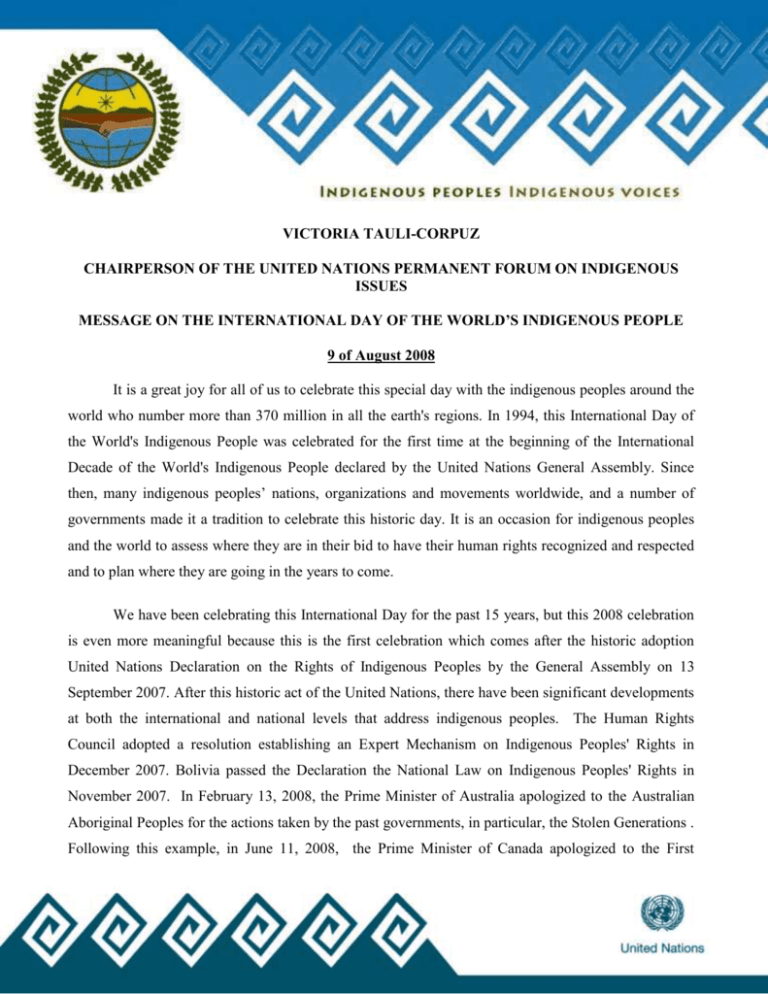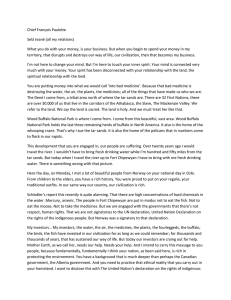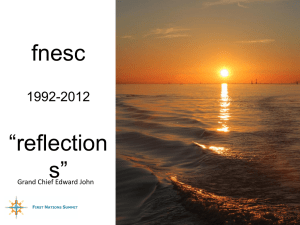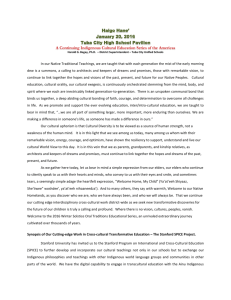VICTORIA TAULI-CORPUZ CHAIRPERSON OF THE UNITED
advertisement

VICTORIA TAULI-CORPUZ CHAIRPERSON OF THE UNITED NATIONS PERMANENT FORUM ON INDIGENOUS ISSUES MESSAGE ON THE INTERNATIONAL DAY OF THE WORLD’S INDIGENOUS PEOPLE 9 of August 2008 It is a great joy for all of us to celebrate this special day with the indigenous peoples around the world who number more than 370 million in all the earth's regions. In 1994, this International Day of the World's Indigenous People was celebrated for the first time at the beginning of the International Decade of the World's Indigenous People declared by the United Nations General Assembly. Since then, many indigenous peoples’ nations, organizations and movements worldwide, and a number of governments made it a tradition to celebrate this historic day. It is an occasion for indigenous peoples and the world to assess where they are in their bid to have their human rights recognized and respected and to plan where they are going in the years to come. We have been celebrating this International Day for the past 15 years, but this 2008 celebration is even more meaningful because this is the first celebration which comes after the historic adoption United Nations Declaration on the Rights of Indigenous Peoples by the General Assembly on 13 September 2007. After this historic act of the United Nations, there have been significant developments at both the international and national levels that address indigenous peoples. The Human Rights Council adopted a resolution establishing an Expert Mechanism on Indigenous Peoples' Rights in December 2007. Bolivia passed the Declaration the National Law on Indigenous Peoples' Rights in November 2007. In February 13, 2008, the Prime Minister of Australia apologized to the Australian Aboriginal Peoples for the actions taken by the past governments, in particular, the Stolen Generations . Following this example, in June 11, 2008, the Prime Minister of Canada apologized to the First Nations, Inuit and Metis for the indigenous children who have been physically, psychologically and sexually abused in federally-funded, church-run residential schools. Just recently, in July 3, 2008, the Japanese Government finally recognized the Ainu as indigenous peoples of Japan, a demand fought for by the Ainu peoples for hundreds of years. Formal apologies and recognition should not be empty rhetoric and should not be the end but the beginning. This should lead to acts of reconciliation where a state and its peoples, try to come to terms with racist and discriminatory actions that have caused long-term suffering, discord and division; humiliation and frustration, injustice and marginalization of indigenous peoples. Reconciliation is a multi-complex process, including provision for redress and the search for truth, justice, forgiveness, healing, in order to find a way to coexist with former adversaries on the basis of equality and mutual respect. It is a process through which a society moves from a divided past to a shared future. This also includes protection and respect of the collective and individual human rights of indigenous peoples as contained in the United Nations Declaration on the Rights of Indigenous Peoples. Reconciliation should also be a specific commitment to address human rights, like the rights to health and housing, education and employment, rights to culture and identity so that the quality of life for indigenous peoples is improved with the goal of ending their over-representation among the poor, the illiterate, the sick and among those who have involuntarily disappeared and those in jails. This brings me back to the United Nations Declaration on the Rights of Indigenous Peoples. The Declaration contains the international minimum standards for the respect, protection and fulfillment of indigenous peoples rights. Many of its articles are taken from existing legally binding agreements like the International Covenant on Civil and Political Rights, the International Covenant on Economic, Social and Cultural Rights and the Convention on the Elimination of all Forms of Racial Discrimination, among others. The Declaration interprets how international human rights law is applied to indigenous peoples as distinct peoples and as collectives. As many countries are engaged in processes of translating the Declaration into action at the national level, we commend initiatives, such as in Bolivia and Ecuador that see the need for the Declaration to be converted into national law. The progress on the implementation of the Declaration, including the outcomes of formal acknowledgements and apologies, are all important issues that Permanent Forum would like to hear more from Governments and the United Nations system. After the adoption of the Declaration, its implementation is the ultimate test of the political will of the duty-bearers, the Governments, the UN System and other intergovernmental bodies. Every International Day of the World's Indigenous People from here on should be used as a day to measure how far the duty-bearer and rights-holders have reached in terms of implementing the UN Declaration on the Rights of Indigenous Peoples. The Second International Decade of the World’s Indigenous People (2005-2015), represents the recognition of the aspiration of indigenous peoples’ to become agents of their self-determined development in order to promote their collective and individual well-being. More specifically, indigenous peoples want a development paradigm that is holistic and enhances indigenous cultures, worldviews, knowledge, livelihoods, economic and governance systems which promote harmony and sustained relationships with their territories and resources. Climate change, the global food crisis, peak oil, intractable conflicts, the unprecedented increasing inequities between nations and within nations, between peoples and between genders, all represent what is wrong with the dominant development model. To ensure the continuing survival of humanity and nature, the radical restructuring of this dominant development has to happen. Indigenous peoples who are still guided by values of reciprocity, equity, solidarity and interconnectedness with nature and who atill continue to practice their sustainable lifestyles should be centrally involved in reshaping development. The task of ensuring that development affirms and realizes the civil, cultural, economic, political and social rights of indigenous peoples and all peoples remains as the biggest challenge for States and non-state actors. The United Nations Permanent Forum on Indigenous Issues commits itself to ensuring the effective implementation of the Declaration and the Second Decade Programme of Action and towards enhancing the unity of indigenous peoples within the framework of the Declaration.









